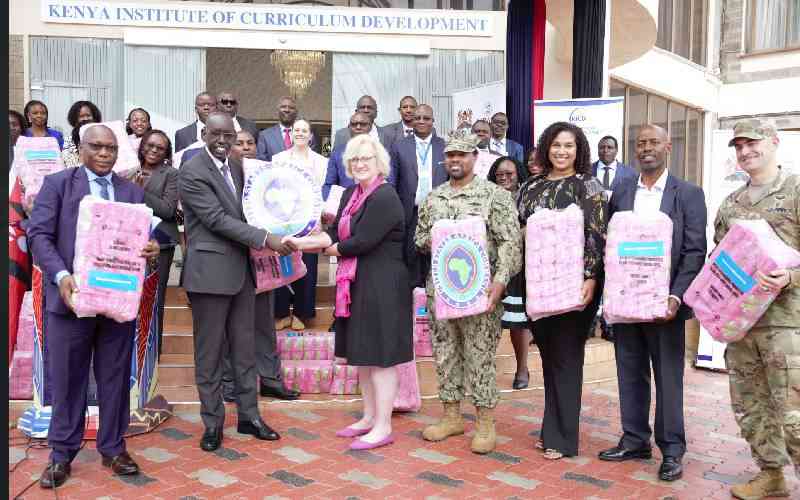The headlines rang in June last year after President Uhuru Kenyatta assented to the Basic Education (Amendment) Act of 2017. The law reads that the government has to provide “free, sufficient and quality sanitary towels to every girl child registered and enrolled in a public basic education institution who has reached puberty...”
This provision, lauded by campaigners and observers, is a big deal for thousands of Kenyan school going girls, whose futures are at risk because of a natural physiological process of menstruation.
Too costly
A study published by consulting firm FSG in 2016 showed that seven out of ten women and girls (65 percent) in Kenya are unable to afford sanitary towels.
For years, campaigners had been drawing attention to the fact that scores of girls in Kenya regularly miss school and some even drop out because they lack the means to manage their menses.
The United Nations’ Educational, Scientific and Cultural Organization (Unesco) estimates that one in ten girls in sub Saharan Africa misses school during their periods, losing up to 20 per cent of school hours in the process because they do not have access to sanitary towels.
Girls from poor and underserved communities are the most affected. Consequently, tales of girls engaging in transactional relationships with older men, for sanitary towels and other basic needs have become too common for comfort.
As the girls try to fend for these basic need for themselves, many of them end up as teenage mothers who eventually drop out of school.
One of the most affected counties in Kenya is Kilifi County.
The 2015 Kenya National Adolescent And Youth Survey (NAYS) findings of Kilifi county published by the National Council For Population and Development shows that primary education is almost universal in the county, with eight out of every 10 (84 per cent) children of primary school going age is in school.
However, only 3 out of 10 (26 per cent) children of secondary school going age is in school. Approximately 92,000 children of secondary school going age are out of school in that county, with child labour, teenage pregnancy and commercial sex work being mentioned as some of the contributing factors.
Many of the children who drop out of school in that county are girls who are forced out of school due to their inability to access sanitary towels and other basic needs.
Raising awareness
It is because of this reality in many parts of the developing world that campaigners have been marking the menstrual hygiene day to raise awareness of the challenges women and girls worldwide face due to their menstruation and highlights solutions that address these challenges.
As we mark the Menstrual Hygiene Day, we have the perfect opportunity to reflect on progress made in securing the right of Kenyan girls to education, free from worries about the natural process of menstruation.
Stay informed. Subscribe to our newsletter
Kenya has made tremendous progress in supporting the tens of thousands of school going girls to overcome the challenges they face with menstrual hygiene. However, we need to do more.
Despite the allocation of Sh470 million for provision of free sanitary towels in the 2017/2018 budget in compliance with the Basic Education (Amendment) Act of 2017, it is only in the last two months that we have seen signs of life for the programme.
On this Menstrual Hygiene Day, we call upon the state agencies to learn from the implementation mishaps of this financial year, and implement the programme better in the coming financial years, enabling Kenyan girls to stay in school and do well for themselves in future.
Ms Samba is the Kenya country director at Deutsche Stiftung Weltbevoelkerung (DSW), an international development agency. [email protected]
 The Standard Group Plc is a
multi-media organization with investments in media platforms spanning newspaper
print operations, television, radio broadcasting, digital and online services. The
Standard Group is recognized as a leading multi-media house in Kenya with a key
influence in matters of national and international interest.
The Standard Group Plc is a
multi-media organization with investments in media platforms spanning newspaper
print operations, television, radio broadcasting, digital and online services. The
Standard Group is recognized as a leading multi-media house in Kenya with a key
influence in matters of national and international interest.
 The Standard Group Plc is a
multi-media organization with investments in media platforms spanning newspaper
print operations, television, radio broadcasting, digital and online services. The
Standard Group is recognized as a leading multi-media house in Kenya with a key
influence in matters of national and international interest.
The Standard Group Plc is a
multi-media organization with investments in media platforms spanning newspaper
print operations, television, radio broadcasting, digital and online services. The
Standard Group is recognized as a leading multi-media house in Kenya with a key
influence in matters of national and international interest.








